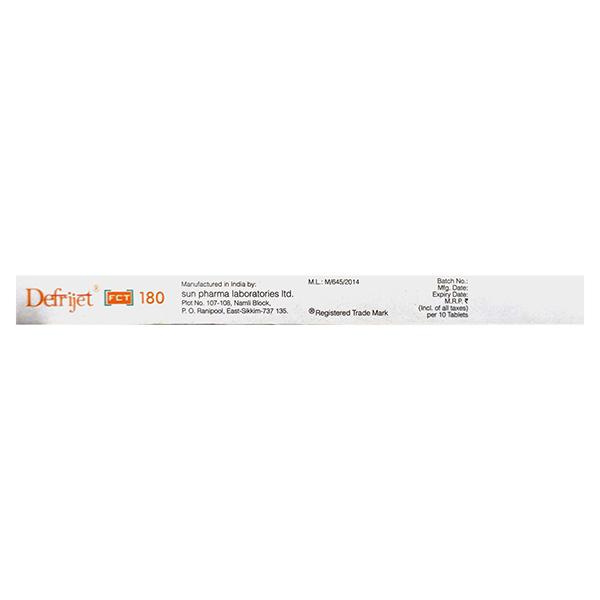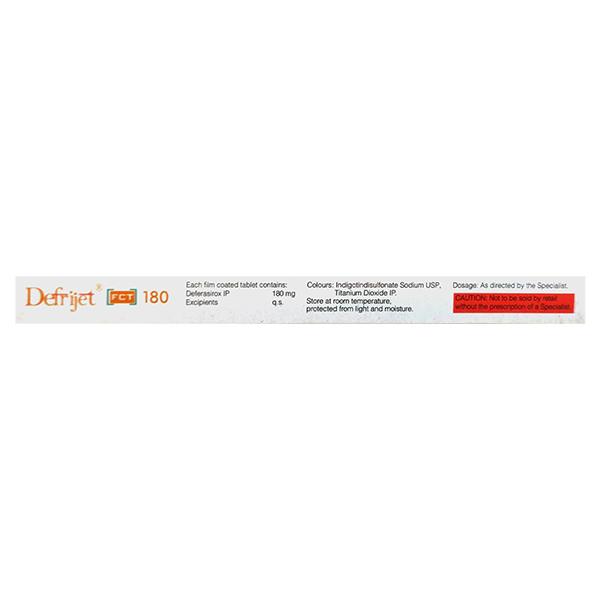

Netmeds First Membership
Quick Links
Introduction About DEFRIJET FCT 180 TABLET
DEFRIJET FCT 180 Tablet 10’s is an iron-chelating agent used to remove excess iron from the body (also known as iron overload). It contains an active ingredient called Deferasirox which traps and removes the excess iron from the body which is excreted mainly in the stools.
DEFRIJET FCT 180 Tablet 10’s benefits people with iron overload caused due to frequent blood transfusions in conditions like beta-thalassemia major, sickle cell disease, and myelodysplastic syndromes. It is also prescribed for patients with non-transfusion-dependent thalassemia who develop iron overload due to increased dietary iron absorption.
Take Defrijet FCT 180 once daily at the same time each day, preferably on an empty stomach or with a light meal. The dosage is determined by the doctor based on iron levels and treatment goals. Regular monitoring of iron levels, kidney function, and liver function is essential throughout treatment.
Common side effects of Defrijet FCT 180 include nausea, diarrhea, stomach pain, vomiting, and skin rashes. In some cases, it may cause serious side effects such as kidney or liver problems, gastrointestinal bleeding, or hearing and vision disturbances. Patients with existing kidney or liver conditions should use this medicine cautiously under medical supervision. Avoid alcohol and grapefruit juice, as they may affect drug absorption.
Defrijet FCT 180 Tablets should be avoided in pregnancy and breastfeeding unless prescribed by a doctor after assessing the risks and benefits. Women should discuss pregnancy planning and breastfeeding options with their healthcare provider before starting or continuing treatment.
Defrijet FCT 180 is approved for usage in children above 2 years (with transfusions), adolescents, and elderly patients, but dose adjustments and close monitoring are necessary, especially in the elderly due to increased side effect risks.
Uses Of DEFRIJET FCT 180 TABLET
- Chronic Iron Overload (a condition characterized by excessive accumulation of iron in the body)
Who Can Use Defrijet FCT 180 Tablet?
Defrijet FCT 180 is mainly prescribed for patients who develop iron overload due to repeated blood transfusions or excessive iron absorption in certain anemias.
It is suitable for use in following patients:
- Patients with Beta Thalassemia Major (6 years and older) – Who have chronic iron overload due to frequent blood transfusions.
- Patients with Beta Thalassemia Major – Who have iron overload due to infrequent transfusions and cannot use deferoxamine or if it is inadequate.
- Patients with Other Types of Anaemias – Who have iron overload and cannot use deferoxamine or if it is inadequate.
- Children aged 2 to 5 years – With iron overload who cannot use deferoxamine or if it is inadequate.
- Patients aged 10 years or older – With iron overload due to conditions associated with excess iron absorption when deferoxamine is contraindicated or inadequate.
Benefits of DEFRIJET FCT 180 TABLET
Defrijet FCT 180 for Iron Overload:
- Reduces Excess Iron Levels: Binds to excess iron in the blood and eliminates it through feces, preventing iron buildup in vital organs like the heart, liver, and pancreas.
- Reduces the risk of Organ Damage: Helps reduce the risk of iron-induced organ toxicity, which can lead to liver cirrhosis, heart failure, and endocrine disorders.
- Convenient Oral Administration: Unlike injectable iron chelators, Defrijet FCT is taken orally once daily, making it more convenient for long-term therapy.
- Alternative to Deferoxamine – Suitable for patients who cannot tolerate deferoxamine or where it is inadequate.
- Pediatric & Adult Use – Can be used in children as young as 2 years old (in specific conditions) and adults, ensuring broad applicability.
How DEFRIJET FCT 180 TABLET Works
Defrijet FCT 180 mg contains Deferasirox, a medicine that helps remove excess iron from the body. When you receive frequent blood transfusions, iron builds up in your organs because the body has no natural way to get rid of it. Too much iron can damage the heart, liver, and other organs, leading to serious health problems.
Defrijet FCT 180 works by binding to the extra iron in the blood. This iron-drug complex is then removed from the body through the stool (feces). By reducing iron levels, this medicine helps protect your organs and lowers the risk of complications from iron overload.
How to use DEFRIJET FCT 180 TABLET
How to Take Defrijet FCT 180 Tablet?
- Always take this medication exactly as prescribed by your doctor.
- The dosage is based on body weight, and your doctor will determine the correct dose for you.
- Take the tablet once daily, preferably at the same time each day, with water.
- It can be taken on an empty stomach or with a light meal.
- If you have trouble swallowing, the tablet can be crushed and sprinkled onto soft food like yogurt or apple sauce and consumed immediately.
When to Take Defrijet FCT 180 Tablet?
- Take once daily, at the same time every day, to maintain consistent iron levels and improve treatment effectiveness.
- Taking it at the same time each day also helps in remembering your dose.
Recommended Dosage:
- For patients receiving regular blood transfusions: 14 mg/kg body weight daily (starting dose).
- For patients not receiving regular blood transfusions: 7 mg/kg body weight daily (starting dose).
- Your doctor may adjust the dose based on treatment response.
- Maximum daily dose:
- 28 mg/kg for transfusion-dependent patients.
- 14 mg/kg for adult patients not receiving regular transfusions.
- 7 mg/kg for children/adolescents not receiving regular transfusions.
Can we Stop Taking Defrijet FCT 180 Tablet?
- Do not stop taking Deferasirox without your doctor’s approval, as iron may start accumulating again.
- Regular medical check-ups are required to monitor iron levels and organ function.
What if I forgot to take DEFRIJET FCT 180 TABLET
- If you forget a dose, take it as soon as you remember on the same day.
- If you miss it for a whole day, skip the missed dose and take the next scheduled dose.
- Do not take a double dose to make up for a missed one.
Overdose
- If you take more than prescribed, seek immediate medical attention.
- Symptoms of overdose may include abdominal pain, diarrhea, nausea, vomiting, and serious kidney or liver problems.
- Carry the medication pack to the hospital for reference.
Side Effects Of DEFRIJET FCT 180 TABLET
Like all medicines, Defrijet FCT 180 Tablet may cause certain side effects, although not everybody gets them.
Some of the common Side effects of Defrijet FCT 180 are:
- Nausea, vomiting,
- Stomach problems like diarrhoea, abdominal pain, bloating, constipation, indigestion
- Skin rash and itching
- Headache, dizziness
- fever, sore throat
- swelling of the arms or legs
- change in the skin’s colour
- tiredness
When to Seek Medical Attention?
Stop taking Defrijet FCT 180 and contact your physician immediately if you experience any of the following side effects:
- severe allergic reactions such as rash, red skin, blistering of the lips, eyes or mouth, skin peeling, high fever, flu-like symptoms, enlarged lymph nodes rash, swelling of the face, throat causing difficulty breathing and dizziness
- decrease in urine output
- signs of liver problems such as drowsiness, upper right abdominal pain, yellowish discolouration of skin or whites of the eye (jaundice) and dark urine
- signs of a high level of ammonia in your blood, such as difficulty thinking or remembering information, solving problems, being less alert, aware, or feeling very sleepy with low energy, which may be associated with liver or renal problems and lead to a change in brain function
- vomiting blood and/or black-coloured stools
- severe abdominal pain
- frequent heartburn
- severe upper stomach pain (pancreatitis)
- blurred or cloudy eyesight
- reduced hearing
How To Manage Side Effects
Some patients taking Defrijet FCT 180 (Deferasirox Film-Coated Tablets) may experience constipation, bloating, or indigestion as side effects. Here are some tips to manage these symptoms effectively:
For Constipation:
- Increase Fiber Intake – Eat more fruits, vegetables, whole grains, and nuts to promote bowel movement.
- Stay Hydrated – Drink at least 8-10 glasses of water daily to soften stools.
- Exercise Regularly – Walking or light physical activity helps stimulate digestion.
- Try Warm Liquids – Drinking warm water or herbal tea in the morning can aid bowel movement.
- Use a Stool Softener – If needed, consult your doctor about using a mild laxative or fiber supplement.
For Bloating:
- Eat Smaller Meals – Instead of large meals, opt for smaller, frequent meals to reduce bloating.
- Avoid Gas-Producing Foods – Limit intake of carbonated drinks, beans, cabbage, onions, and dairy if they worsen bloating.
- Chew Slowly – Eating too fast can increase air swallowing, leading to bloating.
- Stay Active – Light movement after meals can prevent gas buildup.
For Indigestion:
- Take the Medication with Food – Though it can be taken on an empty stomach, if indigestion occurs, take it with a light meal to reduce irritation.
- Avoid Spicy & Fatty Foods – These can worsen indigestion and cause discomfort.
- Elevate Your Head While Sleeping – If you experience acid reflux, avoid lying down immediately after meals and use a pillow to keep your head slightly elevated.
- Consult Your Doctor – If symptoms persist, your doctor may suggest antacids or digestive enzymes for relief.
If constipation, bloating, or indigestion becomes severe or persistent, speak to your doctor for further guidance.
Warning & Precautions
Pregnancy
Consult your doctor- Studies in animals have shown that Deferasirox can cause harm to the developing fetus, including birth defects and pregnancy loss, at doses similar to or lower than human exposure levels.
- Human Data: There is limited data in pregnant women, but due to its potential to harm the fetus, Defrijet FCT 180 Tablets are not recommended during pregnancy unless absolutely necessary.
- Since iron chelation therapy is not typically urgent during pregnancy, doctors may pause treatment and monitor iron levels closely until after delivery.
- Women of childbearing potential should use effective contraception during treatment to prevent pregnancy.
Breastfeeding
Consult your doctor- It is unknown whether Deferasirox passes into human breast milk. However, studies in animals have shown that it can be excreted in milk.
- Due to potential risks to the nursing infant, breastfeeding is not recommended while taking Defrijet FCT 180 Tablets.
- If treatment is necessary, consult your doctor about switching to formula or stopping the medication temporarily.
Driving and Using Machines
Use with CautionDo not drive or operate any machines if you feel dizziness, after taking Defrijet FCT 180 Tablets.
Kidney
Consult your doctorDefrijet FCT 180 Tablets is not recommended for use in patients with moderate to severe kidney disease. It should be used with caution in patients with decreased urine output. Therefore, before taking Defrijet FCT inform your doctor if you have any pre-existing kidney problems, which will make your doctor adjust the dosage and regularly monitor your health condition accordingly.
Liver
Use with CautionDefrijet FCT 180 Tablets should be used with caution in patients with liver problems. Therefore, before taking Defrijet FCT inform your doctor if you have any pre-existing liver problems, which will make your doctor adjust the dosage and regularly monitor your health condition accordingly.
Allergy
ContraindicatedDo not take Defrijet FCT 180 Tablets if you are allergic to Deferasirox or to other ingredients in this medicine.
Heart Disease
Use with CautionDefrijet FCT 180 Tablets should be used with caution in patients with heart diseases due to iron overload. Therefore, inform your doctor before taking Defrijet FCT 180 Tablets as a precaution.
Use In Pediatrics
Consult your doctor- Deferasirox film-coated tablets can be used in children aged 2 years and older who require regular blood transfusions.
- The dose is adjusted based on body weight and increases as the child grows to ensure effective iron removal.
- Deferasirox is not recommended for children under 2 years, as safety and efficacy data in this age group are lacking.
Use In Geriatrics
Monitoring required- Older adults can take Deferasirox at the same recommended dosage as younger adults.
- Elderly patients may experience more frequent side effects, especially diarrhea, kidney dysfunction, and liver issues.
- Doctors should monitor kidney, liver, and gastrointestinal function regularly and adjust the dose if needed to minimize risks.
Other Warnings for DEFRIJET FCT 180 TABLET
Before taking DEFRIJET FCT 180 TABLET inform your doctor if you have:
- low levels of white blood cells, worsening anaemia, pancytopenia, or bone marrow failure
- blurred vision, decreased hearing
- diarrhoea, vomiting
- gastrointestinal ulcers or haemorrhages
Who should not take [GBNKEYWORD
DEFRIJET FCT 180 TABLET is not recommended for use if you have:
- advanced stage of myelodysplastic syndrome (decreased production of blood cells by the bone marrow)
- have advanced stage of cancer
- poor performance status
- severe thrombocytopenia
Drug - Drug interaction
-
Aluminum-Containing Antacids (e.g., Sucralfate, Antacid Tablets)
- Avoid use as Deferasirox may increase aluminum absorption, leading to toxicity.
-
Nonsteroidal Anti-Inflammatory Drugs (NSAIDs) (e.g., Ibuprofen, Naproxen, Diclofenac)
- Increased risk of kidney damage when taken together. Use only under medical supervision.
-
Corticosteroids (e.g., Prednisolone, Dexamethasone)
- May increase the risk of stomach ulcers and gastrointestinal bleeding when used with Deferasirox.
-
Blood Thinners (e.g., Warfarin, Apixaban, Rivaroxaban, Clopidogrel)
- Higher risk of bleeding due to Deferasirox’s effect on platelets. Regular monitoring is needed.
-
ACE Inhibitors (e.g., Enalapril, Ramipril, Lisinopril) & Diuretics (e.g., Furosemide, Hydrochlorothiazide)
- Increased risk of kidney impairment when taken with Deferasirox. Kidney function should be monitored.
-
CYP3A4 Inducers (e.g., Rifampicin, Phenytoin, Carbamazepine, St. John’s Wort)
- Can reduce the effectiveness of Deferasirox by increasing its breakdown in the body.
-
CYP3A4 Inhibitors (e.g., Ketoconazole, Fluconazole, Erythromycin, Clarithromycin, Ritonavir)
- May increase Deferasirox levels, leading to a higher risk of side effects like liver damage.
More Information
Storage
- Keep DEFRIJET FCT 180 TABLET out of the sight and reach of children
- Store DEFRIJET FCT 180 TABLET below 30°C
FAQs About DEFRIJET FCT 180 TABLET
Q: What is Defrijet FCT 180 used for?
A: Defrijet FCT 180 is used to manage chronic iron overload caused by frequent blood transfusions in conditions like beta-thalassemia, sickle cell disease, and myelodysplastic syndromes. It helps remove excess iron from the body and prevents organ damage.
Q: How does Defrijet FCT 180 work in the body?
A: Defrijet FCT 180 Tablet works by binding to excess iron in the blood and forming a complex that is excreted through urine and feces. This prevents iron buildup in organs like the liver and heart.
Q: How should I take Defrijet FCT 180?
A: Take it once daily at the same time, either on an empty stomach or with a light meal. Swallow the tablet whole with water. If you have difficulty swallowing, you can crush the tablet and mix it with soft food like yogurt or applesauce.
Q: What should I do if I miss a dose?
A: Take the missed dose as soon as you remember on the same day. If it is close to the next dose, skip the missed dose and continue with your regular schedule. Do not take a double dose.
Q: What are the common side effects of Defrijet FCT 180?
A: Some of the common side effects of Defrijet FCT 180 Tablet includes nausea, vomiting, diarrhea, abdominal pain, skin rash, and increased liver enzymes. Serious side effects like kidney or liver problems may occur and require medical attention.
Q: Can Defrijet FCT 180 be taken during pregnancy and breastfeeding?
A: Defrijet FCT 180 is not recommended during pregnancy unless the benefits outweigh the risks. Animal studies have shown potential harm to the fetus. It is also not advised during breastfeeding as it may pass into breast milk. Consult your doctor before use.
Q: Are there any food or drug interactions with Defrijet FCT 180?
A: Avoid aluminum-containing antacids, NSAIDs, blood thinners, and certain antibiotics, as they may increase the risk of side effects. Avoid grapefruit, high-fat meals, and alcohol, as they can alter drug absorption and increase toxicity risk.
Q: Can elderly patients take Defrijet FCT 180?
A: Yes, but they may be more prone to side effects, especially diarrhea and kidney issues. Regular monitoring by a doctor is recommended.
Q: Is Defrijet FCT 180 safe for children?
A: Defrijet FCT 180 is approved for children aged 2 years and older who receive regular blood transfusions and for children aged 10 years and older with iron overload due to other conditions. The dose is adjusted based on body weight.
Q: How long should I take Defrijet FCT 180?
A: Defrijet FCT 180 Tablet is usually long-term, lasting months or years, depending on your iron levels. Regular blood tests will help your doctor determine how long you need to continue the medication.











